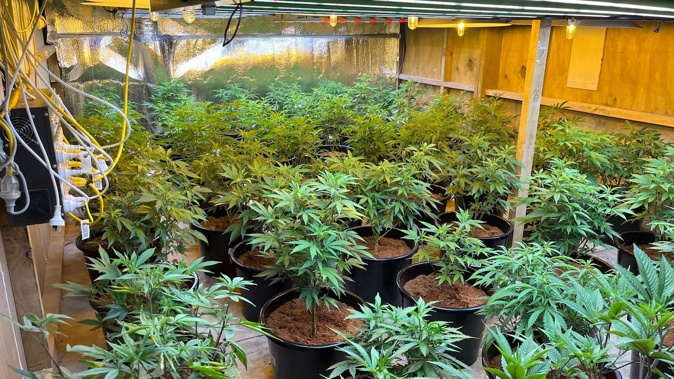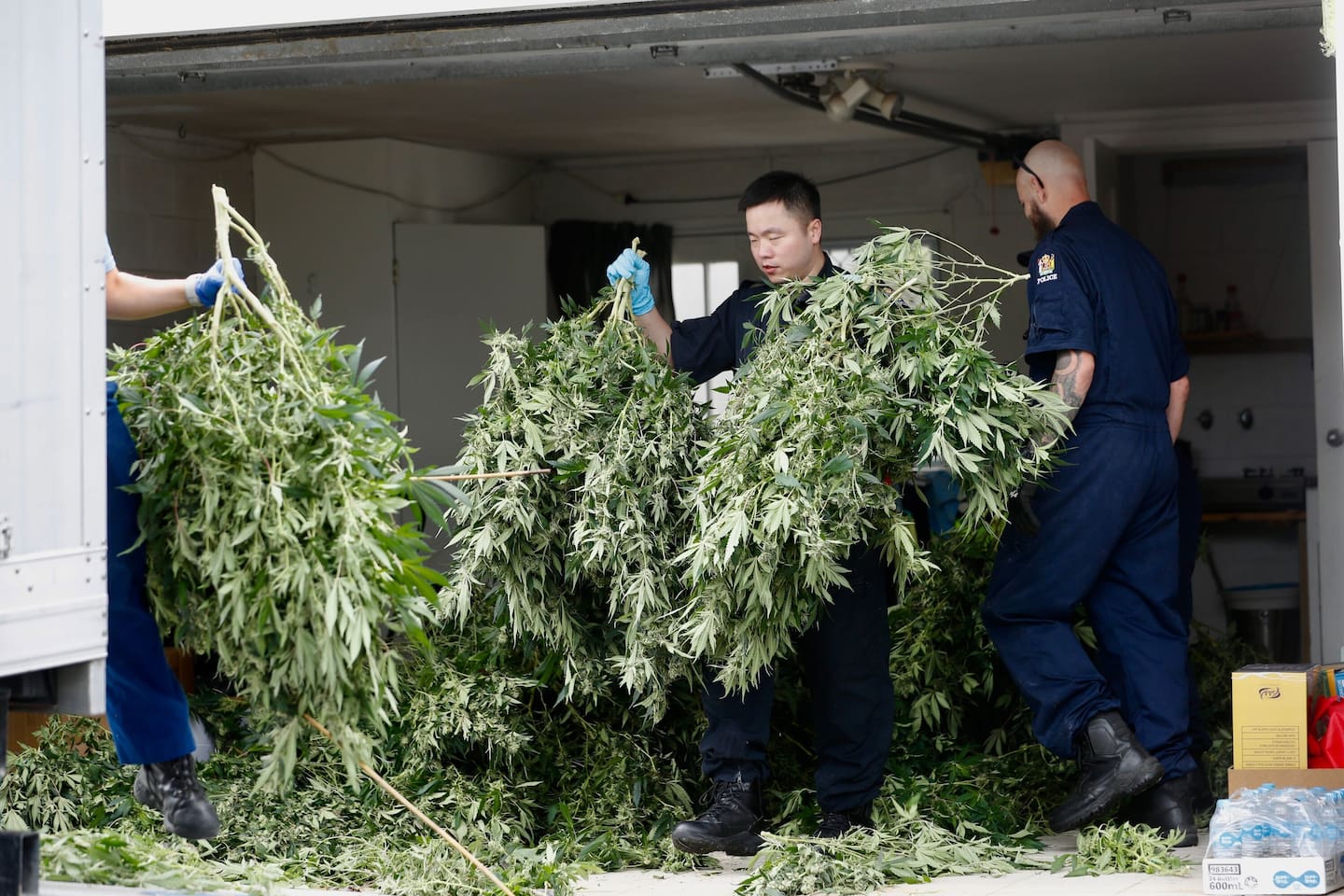
More than 10 tonnes of cannabis has been destroyed by police following raids on clandestine ‘grow houses’ in Auckland run by Vietnamese organised crime groups, the Herald can reveal.
Over a four-week period ending in August, Operation Beryl busted 120 properties - often hiding in plain sight in the suburbs - which had been converted into professional weed nurseries.
By comparison, police had previously shut 97 ‘grow houses’ in the first half of 2025 and a total of 90 last year.
So much cannabis was seized in the latest raids, that four large trucks were needed each week to remove the 11,000 illicit plants for destruction.
The haul was estimated to be worth more than $50 million on the black market, according to police.
“Police efforts have dealt a significant blow to the pockets of organised crime figures and their associates,” Detective Inspector Callum McNeill said.
“This is not a small group of cannabis plants… but would have gone on to fund a range of organised criminal activities in our communities.”
Vietnamese organised crime groups are renowned worldwide for their expertise in cannabis cultivation, and are believed to be behind a proliferation of sophisticated indoor growing systems discovered in New Zealand in recent years.
Cannabis remains a lucrative illicit enterprise and police raids over the past 12 months have netted thousands of plants growing under lights in rental properties, often powered by stolen electricity diverted from neighbouring addresses.
Many of those arrested were Vietnamese nationals, duped into coming to New Zealand on false promises of employment, often after paying tens of thousands of dollars to unscrupulous immigration agents to obtain visas.
Instead of working in the legitimate jobs they were promised, the exploited migrants were forced to tend the cannabis plants as “crop sitters” to repay their supposed debts.
Police arrested 30 people in Operation Beryl and most were Vietnamese nationals who now face deportation.
The raids targeted 120 addresses spread across the wider Auckland region, mostly rental properties, with nine tonnes of cannabis found in the Waitemata police district in a two-week period alone.
Police from the Auckland City district also discovered half a tonne of cannabis in an industrial warehouse in Penrose, while further south, Counties Manukau detectives found 140kg of cannabis and 4200 plants.
 Police seized more than 10 tonnes of cannabis from 120 clandestine 'grow houses' across Auckland during Operation Beryl in July and August 2025. Photo / NZ Police
Police seized more than 10 tonnes of cannabis from 120 clandestine 'grow houses' across Auckland during Operation Beryl in July and August 2025. Photo / NZ Police
Growing cannabis is not the only illegal activity being committed, McNeill said.
“We know these rental properties are often fitted out with shoddy electrical wiring, fuelled by stolen power which is diverted from other properties.
“It’s not only illegal but poses very real dangers to those operating the grow houses and innocent members of the community.”
In some cases, McNeill said the indoor growing systems have started fires in the converted residential homes.
And while police are working hard to target the crime rings, McNeill said landlords need to pay attention or risk insurance not paying out.
“Landlords need to remember they have obligations to carry out due diligence on prospective tenants,” McNeill said.
“If tenants move in and turn your house into a growing operation, you risk being liable in the event of a fire or significant damage.”
He recommended that private landlords take basic steps such as checking references, meeting tenants face-to-face, verifying credit and income details, as well as inspecting the properties regularly.
“Be aware if tenants have a preference to pay rent in cash or offer to pay more to avoid inspections,” McNeill said.
 Police raiding a commercial cannabis operation running out of a residential home in Orakei, Auckland in October 2024. Photo / Dean Purcell.
Police raiding a commercial cannabis operation running out of a residential home in Orakei, Auckland in October 2024. Photo / Dean Purcell.
While the seizure of 10 tonnes of cannabis is by far the largest bust, cannabis ‘grow houses’ linked to Vietnamese organised crime have become an exponentially bigger problem in recent years.
Earlier this year, the Herald revealed another investigation, Operation Clementine, uncovered how Vietnamese organised crime syndicates exploited the visa system to bring in an illegal workforce.
The joint inquiry between police and Immigration New Zealand identified 38 different registered companies with connections to the properties where the cannabis ‘grow houses’ were busted.
Those businesses, often in the construction or hospitality industries, were then targeted in raids which uncovered more hidden cannabis crops.
“During the operation, it was discovered that 11 companies were found or believed to be inoperative,” according to an Immigration NZ briefing released under the Official Information Act.
“Despite this, 203 individuals who hold valid work visas are still present in New Zealand linked to these 11 companies.”
The briefing said that 14 infringement notices were issued to companies employing staff “in a manner that is inconsistent” with a work-related condition of that person’s visa.
Deportation liability notices were issued to 38 people, while two left New Zealand voluntarily.
“Operation Clementine has resulted in a number of interventions which are helping exploited migrants to exit illegal and dangerous situations,” the briefing said.
Others who had been granted visas are now unable to enter New Zealand, the briefing said.
Immigration New Zealand cancelled 62 visas before they left Vietnam, 14 were turned around at the border, and anyone connected to the network of ‘grow house’ companies is now on a watch-list.
“Warnings have been placed on Immigration New Zealand systems on all companies selected for Operation Clementine, and on all the directors or ‘key persons’ linked to these companies, to attempt to mitigate and prevent any future connections with non-compliance and or organised crime,” the briefing said.
 Inside one of the hundreds of cannabis 'grow houses' run by Vietnamese crime groups busted by police in the past 18 months. Photo / NZ Police
Inside one of the hundreds of cannabis 'grow houses' run by Vietnamese crime groups busted by police in the past 18 months. Photo / NZ Police
Steve Watson, the general manager in charge of investigations and compliance at Immigration NZ, was reluctant to disclose how Operation Clementine started.
But he said some patterns had been noticed that “didn’t seem quite right” and his staff worked closely with police to solve the problem together.
“We will use the information we’ve gained from this, the learnings, to help inform how we manage risk going forward.”
Watson said many of the Vietnamese nationals caught up in Operation Clementine came into the country on legitimate grounds.
“Once they’ve got here, they’ve been talked into, or moved sideways, into illicit work,” Watson said.
“It’s definitely something of concern because from a victim’s point of view, we want to protect migrants and not see them exploited or involved in criminality.
“But sometimes they are complicit, or know what they’re doing, and that’s part of the investigation that does take a lot of time.”
The joint investigation was also looking for connections between the directors and shareholders of the 38 different companies linked to the cannabis ‘grow houses’ that had been discovered.
Going forward, Watson said the main focus of Immigration New Zealand was prevention of migrant exploitation before they even applied for a visa to live here.
One of the concerns for Watson were stories of migrants paying large sums of money to “unscrupulous” agents to obtain visas.
“We’re talking $10,000 or $20,000. I’ve heard up to $30,000,” Watson said previously.
“That’s something we want to put a stop to. The correct way to come to New Zealand is to come straight to us [Immigration NZ].”
Although Operation Clementine is an example of co-operation between two law enforcement agencies, a group of experts advising the Government on organised crime has warned that more needs to be done.
“Information sharing between government agencies is deficient. In some cases, that is because there are specific legislative barriers. In others, the willingness to share information proactively is due to the culture of organisations,” the advisory group wrote in March.
“We need to have a mature conversation about the privacy settings which balances the need to combat organised crime effectively, without compromising individual privacy interests.”
Jared Savage covers crime and justice issues, with a particular interest in organised crime. He joined the Herald in 2006 and has won a dozen journalism awards in that time, including twice being named Reporter of the Year. He is also the author of Gangland, Gangster’s Paradise and Underworld.
Take your Radio, Podcasts and Music with you









